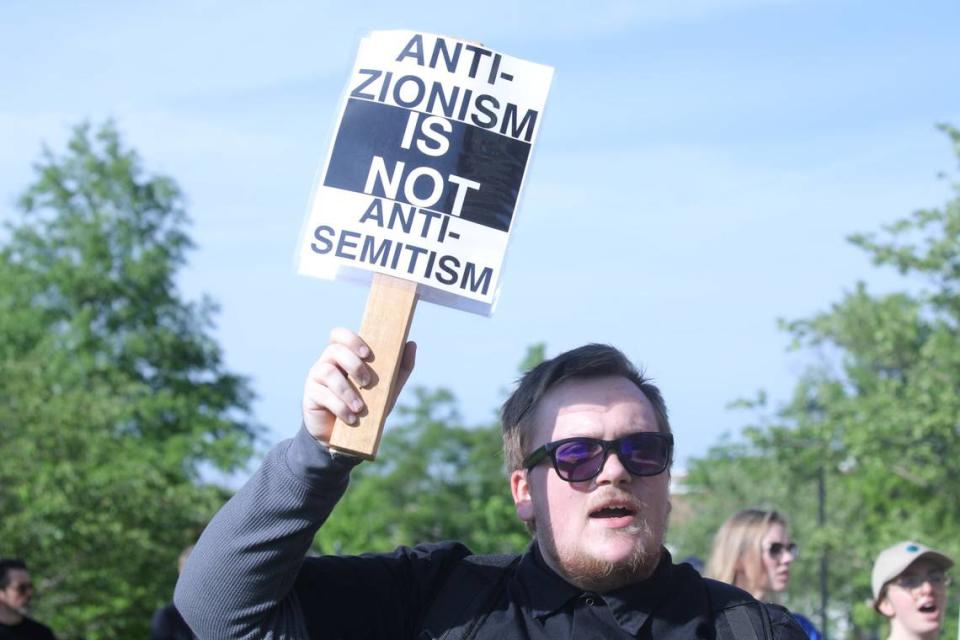‘Tsunami of hate’ flooding Kentucky and its colleges as antisemitism rates soar
- Oops!Something went wrong.Please try again later.
Antisemitism is on the rise in Kentucky, with incident rates more than doubling over the past two years.
Kentucky saw 47 separate antisemitism incidents in 2023, according to the Anti-Defamation League, an organization aiming to stop the defamation of Jewish people. That’s a steep increase from the 16 reported in Kentucky in 2022, of which only one occurred on a college campus.
Of the incidents reported last year in the commonwealth, eight occurred on college campuses.
“We have never seen anything like the tsunami of hate and harassment that has sprung up since Oct. 7,” Adam Lehman, the CEO of the nation’s largest Jewish student organization, Hillel, said at a meeting of the Kentucky Antisemitism Task Force Wednesday.
The task force acts as an advisory group to the governor. In the executive order creating it, signed by Gov. Andy Beshear in December 2023, the 18-person group was charged with conducting a comprehensive review of the “growing threat” of antisemitism in the commonwealth. Statistics from the Anti-Defamation League have been cited by Beshear to show the need for the task force.
Oct. 7 marked the official start of the Israel-Palestine war, which has since claimed more than 34,000 lives. A Palestinian militant group launched an attack on Israel, killing 1,200 people and taking 253 hostages. Israel has since returned fire, leveling the Gaza strip.
To show support for innocent Palestinians stuck in the middle of conflict, protests and encampments have popped up all over the country, including at some Kentucky colleges. Lehman said some of those same protests have harbored antisemitic language, alienating Jewish students.
David Kaplan, a task force member and chairman of the Jewish Community of Louisville, shared that his own daughter is a student on the University of North Carolina Chapel Hill campus, one of the many campuses across the country housing student encampment protests in support of Palestine. He said a woman on campus called Oct. 7 a “beautiful day.”
“This is a form of antisemitism that has, in the minds of the people who are guilty of it, a solid moral justification,” he said. “I don’t think any amount of campus regulation of speech or sort of top-down regulation is going to address that.”
Lehman said people should be able to talk about and criticize Israel without being labeled antisemitic, but said there is a fine line between criticism and hate.
“Regardless of one’s views of the Israeli government or even (how) the current war in Gaza may fall out … the complete demonization and advocacy for the destruction of the state of Israel can translate to antisemitism,” he said.

At Wednesday’s meeting, the task force voted to create a subcommittee focused on antisemitic education in K-12 and higher education institutions. They will meet for the first time next month.
Antisemitism on Kentucky college campuses
Of the eight reported antisemitic occurrences at Kentucky’s higher education institutions cited by the Anti-Defamation League, six happened after the Hamas attack on Israel.
Between Oct. 12 and Nov. 17, four protests at the University of Louisville had posters with antisemitic language, such as, “From the river the the sea, Palestine will be free.” The Anti-Defamation League labels this as antisemitic because it calls for “dismantling of the Jewish state” to extend Palestinian occupancy.
In late November, a poster raising awareness for the kidnapping victims of the Oct. 7 Hamas attack was torn down from an academic building at the University of Kentucky. In December, at the University of Transylvania, a Jewish student was called a “genocidal Zionist” on a social media app.
Jewish students weren’t free of harassment prior to the war in Palestine. Chabad of the Bluegrass, which is located near UK, received a threatening letter telling Jewish students to abandon their faith. The center got a similar letter in June.
UK Dean of Students Trisha Clement said UK has been particularly attentive to the Jewish community since the beginning of the Israel-Palestine conflict. She highlighted university sponsored listening sessions, where students were invited to tell administrators about their daily campus lives.
“We truly make an effort to make sure that our students have the space and support that they need,” she said. “We wanted to make sure we provide the space and time for our students to talk to us about what they’re feeling and experiencing as they walk across campus … It is important that we all stay very connected.”
Lehman said instances of antisemitism in Kentucky are not as severe as those seen in other states, which could make interfaith dialogue, a strategy he suggested to promote inclusion, easier to achieve on college campuses.
“I think we have failed our youth across the county by not providing them safe spaces,” task force member Muhammad Barbar said.

